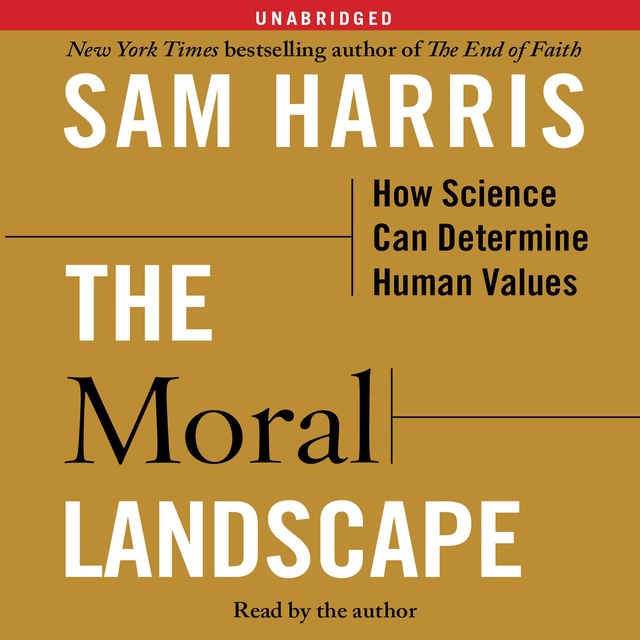صدر حديثًا
هذا الكتاب جديد وسيتم رفعه فور توفره لدينا وبعد الحصول على حقوق النشر اللازمة.

كتاب The Moral Landscape: How Science Can Determine Human Values PDF
(0)
المؤلف:
سام هاريسعدد القراءات:
107
اللغة:
الإنجليزية
الفئة:
علوم اجتماعيةالقسم:
الصفحات:
349
الجودة:
ممتاز
المشاهدات:
1293
اقتباس
مراجعة
حفظ
مشاركة
وصف الكتاب
Sam Harris' first book, The End of Faith, ignited a worldwide debate about the validity of religion. In the aftermath, Harris discovered that most people - from religious fundamentalists to non-believing scientists - agree on one point: science has nothing to say on the subject of human values. Indeed, our failure to address questions of meaning and morality through science has now become the most common justification for religious faith. It is also the primary reason why so many secularists and religious moderates feel obligated to "respect" the hardened superstitions of their more devout neighbors.
In this explosive new book, Sam Harris tears down the wall between scientific facts and human values, arguing that most people are simply mistaken about the relationship between morality and the rest of human knowledge. Harris urges us to think about morality in terms of human and animal well-being, viewing the experiences of conscious creatures as peaks and valleys on a "moral landscape." Because there are definite facts to be known about where we fall on this landscape, Harris foresees a time when science will no longer limit itself to merely describing what people do in the name of "morality"; in principle, science should be able to tell us what we ought to do to live the best lives possible.
Bringing a fresh perspective to age-old questions of right and wrong and good and evil, Harris demonstrates that we already know enough about the human brain and its relationship to events in the world to say that there are right and wrong answers to the most pressing questions of human life. Because such answers exist, moral relativism is simply false - and comes at increasing cost to humanity. And the intrusions of religion into the sphere of human values can be finally repelled: for just as there is no such thing as Christian physics or Muslim algebra, there can be no Christian or Muslim morality.
Using his expertise in philosophy and neuroscience, along with his experience on the front lines of our "culture wars," Harris delivers a game-changing book about the future of science and about the real basis of human cooperation.
سام هاريس
سام هاريس (مواليد 1967) كاتب وفيلسوف وعالم أعصاب أمريكي. وهو مؤلف كتاب نهاية الإيمان: الدين والإرهاب ومستقبل العقل(2004) ، الذي فاز بجائزة بين / مارثا البراند لعام 2005 ، و رسالة إلى أمة مسيحية (2006) ، وهو رد على الانتقادات لكتابه الأول. يستكشف كتابه الجديد ، المشهد الأخلاقي ، كيف يمكن للعلم أن يحدد القيم الإنسانية.
بعد تعرضه لانتقادات شديدة ردًا على هجماته على المعتقد الديني العقائدي ، يتوخى هاريس الحذر بشأن الكشف عن تفاصيل حياته الشخصية وتاريخه. لقد قال إنه نشأ على يد أم يهودية وأب كويكر ، وأخبر نيوزويك أنه عندما كان طفلاً ، "رفض أن يكون بار ميتزفهيد". التحق بجامعة ستانفورد باعتباره تخصصًا في اللغة الإنجليزية ، لكنه ترك المدرسة بعد تجربة غيرت حياته مع MDMA. خلال هذه الفترة درس البوذية والتأمل ، وادعى أنه قرأ مئات الكتب عن الدين. في 21 أغسطس 2009 في وقت حقيقي مع بيل ماهر ، صرح هاريس أنه نشأ في منزل علماني وأن والديه لم يناقشا الله أبدًا. ومع ذلك ، فقد ذكر أنه كان دائمًا مهتمًا بالدين.
بعد أحد عشر عامًا ، عاد إلى ستانفورد وحصل على بكالوريوس الآداب في الفلسفة. في عام 2009 حصل على درجة الدكتوراه. شهادة في علم الأعصاب من جامعة كاليفورنيا ، لوس أنجلوس ، باستخدام التصوير بالرنين المغناطيسي الوظيفي لإجراء بحث في الأساس العصبي للاعتقاد وعدم التصديق وعدم اليقين.
الكتاب غير متاح حاليًا
هذا الكتاب غير متاح حاليًا للنشر. لقد حصلنا عليه من بموجب ترخيص المشاع الإبداعي، ولكن المؤلف أو دار النشر لم يمنحا الإذن بنشره.
قيم الآن
5 نجوم
4 نجوم
3 نجوم
2 نجوم
1 نجوم
اقتباسات The Moral Landscape: How Science Can Determine Human Values
الأعلى تقييماً
الأحدث
اقتباس
كن أول من يترك اقتباسًا واكسب 10 نقاط
بدلاً من 3
التعليقات
كن أول من يترك تعليقًا واكسب 5 نقاط
بدلاً من 3